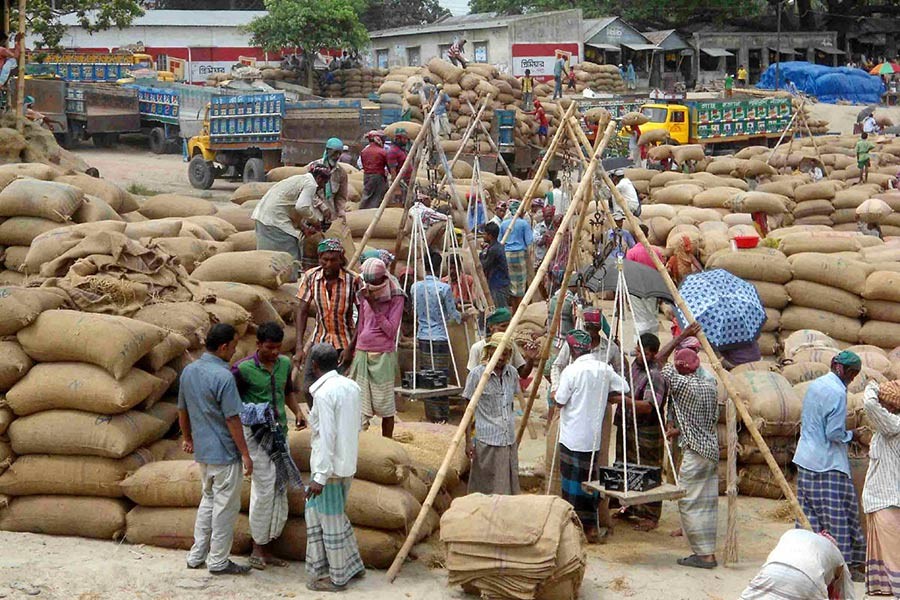Paddy prices up, still below production cost
Millers and traders, not farmers, to benefit most from govt measures: Experts

Published :
Updated :

In the wake of government's initiatives, the prices of paddy have seen a rise in the last one week but still fall short of the production cost.
The government's measures helped shore up the paddy prices, but farmers could not reap the full benefits, experts said.
Rather, it is the millers and traders who would mostly cash in on the government initiatives and bumper production of the crop, they added.
The prices of paddy of different varieties increased to Tk 570 (hybrid) and Tk 680 (Birridhan-28) a maund across the country from Tk 400 and Tk 550 respectively in a week, according to the Department of Agricultural Marketing (DAM).
But the market price is still 32-35 per cent short of the production cost (Tk 880-Tk 1000 a maund based on varieties and regions) as estimated by the Department of Agriculture Extension (DAE).
This Boro season saw paddy prices fall sharply at the beginning of harvest in April last amid robust production and the lack of government initiatives.
Such a price debacle made the farmers furious; many of them even set fire to their paddy fields in protests during the May-June period, according to media reports.
To prevent the situation from spiralling out of control, the government came up with several measures, including raising duties on rice import, allowing rice export and reviewing the paddy procurement target.
As part of the measures, the rice import duties have been raised to 55 per cent from 28 per cent earlier.
Last week, the food ministry announced that the government would buy an additional 0.25 million tonnes of paddy directly from the farmers.
Earlier, the target was to procure 1.15 million tonnes of rice and 0.15 million tonnes of paddy from the millers and farmers in the Boro season, according to the Directorate General of Food (DGoF).
Jasim Uddin, a farmer at Haibatpur union in Jashore sadar upazila, told the FE over cell phone that he and his fellow farmers incurred massive losses this year.
"I grew Birridhan on two bighas of land (one bigha = 33 decimals) at a cost of Tk 29,500," he said.
"My yield was 37 maunds of paddy whose market price was below Tk 20,000 last month."
"However, I had to sell most of the crops as I badly needed money for the Eid festival," he said.
The government should help farmers with direct cash incentives this year, he said, adding that otherwise many would give up rice farming.
According to the Bangladesh Krishak Samity, a platform of farmers, the paddy growers lost 40-60 per cent of their investments in this Boro season.
Agricultural economist Prof Golam Hafiz Kennedy said farmers will virtually get no benefits from the latest government initiatives.
More than 60 per cent of farmers in the country are marginal growers who have already sold their produce, he said.
"And big millers and traders have already bought the paddy and now will take the advantage of the government initiatives," he added.
They will get the benefits from public procurement and exports, said Prof Hafiz.
And they will raise the rice prices in coming months in the name of higher import duty, he added.
Iqbal Hossain, a researcher at the state-run Bangladesh Institute of Development Study (BIDS), told the FE that the government's first priority should have been to include farmers in its procurement drive directly.
At least 4.5 million tonnes of the staple, in paddy form, should be bought from the farmers annually, he said.
He said the government has an indirect 'minimum support price' (MSP) -- the price fixed by the government for its rice and paddy procurement.
"It should be given a legal framework as in neighboring India, which could act as a shield for farmers," he said.
The rice production in the country is set to cross 19.7 million tonnes in this Boro season, according to the DAE.
And more than 95 per cent of Boro harvesting has been completed in the country so far, said the DAE monitoring unit.
Meanwhile, retail rice price remained static in the last one week in the city.
The current rice prices in Dhaka are 10-17 per cent lower from the rates in the last year, according to the Trading Corporation of Bangladesh (TCB).
However, traders said, rice prices might increase with hike in paddy prices.


 For all latest news, follow The Financial Express Google News channel.
For all latest news, follow The Financial Express Google News channel.